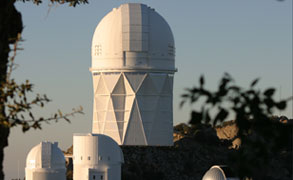Award-winning writer and producer Kris Koenig and the Interstellar Studios production team traveled the globe, interviewing leading astronomers and cosmologists against a backdrop of the world’s greatest observatories, to create a vivid film that presents the human quest of the past 400 years to understand the structure and nature of the universe. 400 Years of the Telescope is narrated by astrophysicist Neil deGrasse Tyson (host of NOVA ScienceNow), features a lush score performed by the London Symphony Orchestra, and is an official product of the International Year of Astronomy 2009.

Kitt Peak National Observatory
Find Arizona planetariums and NASA Night Sky Network astronomy clubs
From reenactments of Galileo’s invention and early pen drawings of the moons of Jupiter, to vivid multi-colored nebulas captured by the Hubble Space Telescope, 400 Years of the Telescope takes viewers from their armchairs into the wonders of space exploration. With warmth and humor, the planet’s top astrophysicists enthusiastically discuss momentous discoveries, and define dark energy – a mysterious vacuum energy that is accelerating the expansion of the universe. Looking into the future, viewers will learn of emergent telescopes the size of stadiums, and a massive radio telescope array that will be perched on one of the highest plateaus on the planet - enormous new instruments that may detect life outside our solar system, and allow humans to view the initial moments of the Big Bang. Like Galileo’s first telescopic observations, these new technologies will reshape our entire perception of the universe.

By submitting your comments, you hereby give AZPM the right to post your comments and potentially use them in any other form of media operated by this institution.